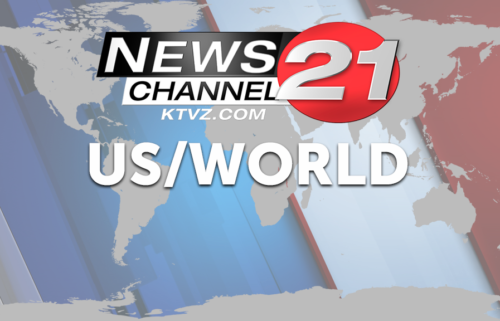New NHL team marks coming-of-age moment for Salt Lake City as a pro sports hub
By HANNAH SCHOENBAUM
Associated Press
SALT LAKE CITY (AP) — To casual sports fans and people outside northern Utah, it may look like an NHL team fell into Salt Lake City’s lap in the span of two weeks.
But local organizers say the Arizona Coyotes ‘ relocation to Utah is the product of a yearslong effort to beckon professional hockey and other elite sports to the fast-growing capital city.
The move announced Thursday marks a coming-of-age moment for Salt Lake City as a pro sports hub in the Mountain West, giving the midsize market its second major professional sports franchise in the 45 years since it welcomed the NBA’s Utah Jazz.
Now it remains to be seen if the city can generate the same enthusiasm for hockey that it has for basketball — and whether it can provide the stability required for a team that has bounced from place to place over the past few years, observers say.
Utah already has plans bubbling for a new hockey-specific stadium that could also serve as a key venue when it hosts the 2034 Winter Olympics, which the International Olympic Committee is expected to make official this summer. In the meantime, the team will share the Delta Center with the Jazz.
Salt Lake City is also aggressively pursuing an MLB expansion team — which would make it home to three of the “Big Four” U.S. leagues — with advanced plans calling for a new baseball stadium. And Utah billionaire Ryan Smith, who owns the Jazz, pro men’s and women’s soccer teams Real Salt Lake and the Utah Royals, and, now, the new hockey team, has applied to work with the city to transform part of downtown into a sports and entertainment district.
Together, those efforts expand Salt Lake City’s footprint in the sporting world and give the renowned winter sports destination a chance to prove it can sustain multiple pro teams year-round.
Salt Lake City Mayor Erin Mendenhall called the Coyotes’ move a “defining moment” in the city’s trajectory that she said unlocks new potential for growth. State and municipal leaders have been outspoken about leveraging a local love of sports to propel the city forward. That strategy has proved successful in other midsize cities, including Las Vegas, which is home to NFL and NHL teams and has an MLB team on the way.
When given opportunities to host major sporting events, from the 2002 Winter Olympics to last year’s NBA All-Star Game, Salt Lake City hasn’t failed to deliver, said Jeff Robbins, president and CEO of the Utah Sports Commission. Although the NHL transfer may seem sudden, he said, it was made possible by the confidence Utah has instilled in industry leaders over several decades.
“It didn’t fall in our laps,” Robbins said. “What you’re seeing is a lot of momentum around what we’ve been working towards for a long time.”
While several other U.S. and Canadian cities have been vying for an NHL team, Salt Lake City was quick to offer the Coyotes a “soft landing spot” after years of tumult, said David Carter, a sports business professor at the University of Southern California.
The Coyotes have bounced between stadiums, most recently playing in a 5,000-seat arena. Plans for a new hockey stadium may have helped lure them to Utah, but Carter cautioned that they could again end up without a permanent home if that doesn’t pan out, or if Smith’s company cannot generate enough media revenue, ticket sales and sponsorships to ensure the team’s longevity.
NHL Commissioner Gary Bettman said he wanted to place the Coyotes with trusted owners in a location where they could be “successful immediately.”
“We focused on the fact that these are the types of owners that we want, and this is the type of community we’d like to be a part of,” Bettman said Friday.
Hockey fans beyond the Beehive state have also questioned whether the moderate metropolis — home to just over 200,000 residents — can sustain a pro team.
Including the suburbs, the greater Salt Lake Valley has a population of nearly 1.26 million, and a light-rail system that can drop suburbanites steps from the downtown stadium. Jazz fans have packed the Delta Center for decades, even in losing years, but time will tell whether the basketball bandwagon translates to a similar hockey hype.
Early data looks promising to Smith, who said Friday that the team had already hit 22,700 season ticket deposits — more than quadruple the seats in the Coyotes’ current stadium and nearly twice the Delta Center’s current capacity for hockey.
The sport has started to take off locally since Salt Lake City began hosting Frozen Fury, an NHL pre-season exhibition game, in 2021, Robbins said. The valley is now home to 17 rinks, a youth hockey program and a minor league team that hit a new average attendance record this season.
For former NHL player Ken Sabourin, who spent part of his career playing in the minors in Salt Lake City, it was “a great place to play” with good crowds. While he thinks the local infrastructure is in place, he worries the Coyotes — ranked second to last in their division — are not a strong enough team to captivate their new community.
“It’s a good hockey market; it’s a good sports market,” said the player-turned-analyst. “I think they have the fans. It’s whether they’ll come out or not.”
___
AP Hockey writer Stephen Whyno contributed to this report.

